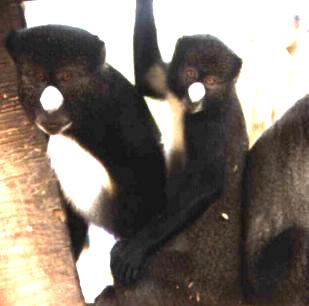For the information of the reader Dr. Doolittle: researchers have discovered that the sounds made by the baboons can be considered language buds and are used for complex communication between the monkeys. Let's hear
Zvi Atzmon, Galileo

White-nosed monkey (Cercopithecus nictitans) is a species of tree-dwelling monkey that lives in the forests of Central and West Africa. The Gonons live in groups; Each group has 13 to 22 individuals, of which 6 adult male, 9 to XNUMX adult females and the rest are young. In response to a disturbance, the adult male utters one of two types of sounds: a sound that sounds a bit like a knock, similar to the syllable heck (click to hear), and a prolonged and "softer" sound, which sounds like a phew (click to hear).
Although, during the morning grazing and during the evening journey to the sleeping sites, the male probably makes these sounds spontaneously as well, but usually these sounds are used to warn the group against the approach of a predator, and even constitute an attempt to drive it away; A tiger that has found out that it has been discovered tends to leave the group and try to satisfy its hunger elsewhere. Heck sounds are mainly made to indicate the approach of the crowned eagle - a large raptor that mainly feeds on gourds, while peew sounds - to indicate the presence of a tiger in the vicinity.
And here, researchers Kate Arnold (Arnold) and Klaus Zuberbuhler (Zuberbuhler) from the Department of Psychology at the University of St. Andrews, England, found in field studies among free-nosed goons, that in addition to these basic sounds, the males also make a special combination of these two calls, a vocal combination that the researchers Called piw-hek (abbreviated notation: p-e - click to hear the sound). This combination includes one to three readings of "few" and then up to four readings of "hek". The general duration of the special reading is 3 to 9 seconds, and this means a very short interval between one reading element and another.
This combination is uttered by the male both at the sight of a tiger and at the sight of a crowned eagle, and the researchers report that close to uttering this complex call, the group begins to move. Calls of "hek" by themselves ("crowned eagle in the field") do not normally provoke movement of the group, and the researchers explain this by saying that movement in this case is a dangerous act - the movement may reveal the mannerisms to the eyes of the eagle hunting for prey. However, in those cases where the sound combination P-E was heard, the vowels began to move, and moved a much greater distance compared to the movement that was not preceded by this vocal combination.
From this, the researchers conclude that the combination "nemer-eagle" (saliha, piw-hek) has a special meaning, different from its components, in the language of the Gonons for the Hafs, to say: "Guys, start moving!", and this in any case of movement, even without Connection to the presence of a predator in the field. Adding words to a meaning different from the literal combination (say: the combination school-school, which creates a different term from the sum of the components home+school) is a feature that characterizes human language, the researchers point out, adding that the evolutionary source of this human ability is unknown. And here, according to them, they revealed as a kind of first bud of this "syntactic" ability in the genes of the free living under natural conditions.
To illustrate the process of creating new concepts by combining other concepts in the human language - and in this case, in the Chinese script - I will allow myself to quote a short passage from Wislawa Szymborska's wonderful book "Permission Request" (translated from Polish by Rafi Weichert). The passage refers to the book that the Chinese writer was interested in: "'Wife' is a woman with the addition of a broom, 'lover' is a woman with the addition of a flute." And if we apply Szymborska's description to the voices of the male characters, it would be said like this: "Leave everything and start moving" this is a tiger with the addition of a crowned eagle...
And perhaps Shlomo, the wisest man, and Doctor Doolittle witnessed the syntactic ability of animals even before this study, published in the May 18 issue of the science weekly "Nature".
